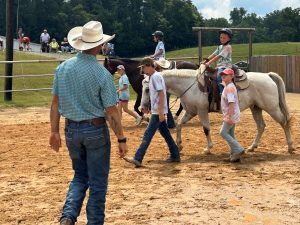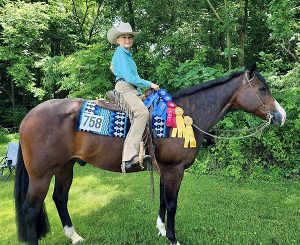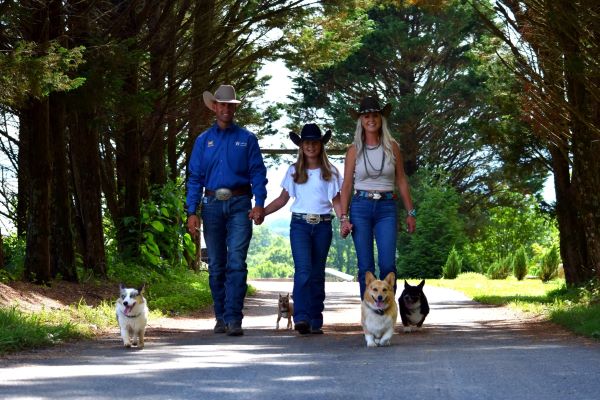The Summer Camp of Jeremy May Show Horses
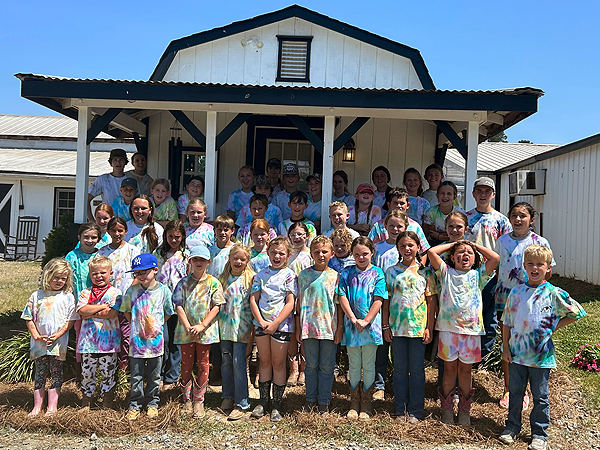
The Summer Camp at Jeremy May Show Horses fosters a foundation of future riders and a sense of accomplishment.
The annual summer camp at Jeremy May Show Horses in North Carolina doesn’t just have a lasting impact on the industry. It has proven to be pretty good for one’s soul, too.
By Delores Kuhlwein
“The bond between human and animal is a source of unlimited strength and resilience.” ― Christopher McDougall, Running with Sherman.
Summer camps serve up nostalgia for countless horse lovers – the setting where many fell in love with horses, learning the basics of safety and horsemanship, along with the extraordinary freedom horses offer.
One of those summer camps has been in existence for 24 years in the Village of Tobaccoville, North Carolina, run by the capable hands of AQHA Professional Horsemen Jeremy and Rebekah May. Rebekah had started the camp at age 15, and the couple continued the tradition no matter what life threw their way due to the impact they witnessed.
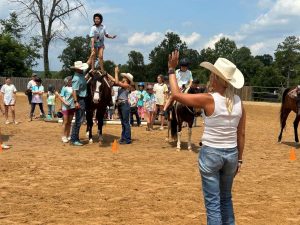
By the end of the week of summer camp, AQHA Professional Horseman Rebekah May is often brought to tears by the progress of the youth.
In fact, the birth of their daughter, Preslee, didn’t slow them down – it only inspired the Mays to carry on. “As Preslee started growing, she has brought more people to our barn,” explains Rebekah. She inspires kids to want to ride, Rebekah says, and what she does with her horses has resulted in the family connecting with additional members of their community.
What happens in those camps – their ranch camp, and their advanced camp – turns out future riders, and future show exhibitors, but that’s not all. “Some definitely grow a love for horses, and some continue to take riding lessons,” says Rebekah. “Other kids leave with a sense of accomplishment – they faced fear and showed themselves they could do it.”
“They also leave with a sense of responsibility, accountability, and teamwork,” reveals Jeremy.
The First Day is the Hardest
Anyone who has volunteered or worked at a horse camp knows that camps aren’t always a picnic in the beginning, however.
- Preslee and Rebekah’s late father practicing the morning tradition of “Yee Haw!”
“I tell my counselors Monday is the hardest day,” explains Rebekah, who says their ranch camp for ages 5-12 is geared toward beginners. “That’s where they have never sat on a horse, and some are scared to death. By the end of camp, they are walking and jogging, some with others leading, and some on their own.”
- Bennett Harris, son of Kimberly and Stanton Harris, attends the summer camp.
It takes a village, the Mays explain, with 30 kids, such as 10-15 helpers who donate their time, and an onsite nurse who volunteers.
The first day is set aside for introductions, rules, safety, and the Mays stand and turn toward the flag, saying the pledge and a prayer before they get started. They also teach the kids the tradition of starting with a big “Yee Haw!” in honor of Rebekah’s late dad.
They sing camp songs, and then hold their icebreaker, but this is no introductory activity that starts with Post it notes and awkwardness. Rebekah says, “We play dodge ball, a staple at camp, in our round pen which is boarded on the sides, and that really gets them going and gets them to know each other.”
- Dodgeball is the traditional icebreaker on the first day of camp – and it works seamlessly!
Then the attendees break up into groups to get their horses, and each group of three has a counselor; they tack up while helpers circulate to make sure everyone is comfortable, explains Rebekah. “If we know they’re not, we assign a person to help the individual get more comfortable.”
The kids rotate activities- one group crafts while the other rides, and they all spend time learning about horses which involves a day with a visit from the vet, and fun is never far away; they play horse related games, water games, and more. What they find by the end of camp is that the kids who wouldn’t stand up for “around the world” are not only getting up but they’re waving at their parents at the horse show they hold for the families to watch on Friday.
By Friday, Rebekah says, “I could cry with the improvements with these kids – the ones who thought they couldn’t do it at all – when they see they can. We have some autistic kids who have come through, and the parents cry because they didn’t think they could do it.” The key, she says, in addition to safety, is patience, “Jeremy is so patient with the kids,” she adds.
The Mays offer two camps: the beginner-geared ranch camp, and an advanced camp for their kids who aren’t showing but are trying to get to the breed show level by dabbling at the open shows with some of their horses. “They ride all morning, and in the afternoon, we do horse trivia to learn about colors, breeds, conformation,” Rebekah says.
The sense of community weaved throughout the atmosphere includes awards such as most improved – awards that fit their experience, and the whole camp votes on Camper of the Week.
In the Words of the Saunders Family
A perfect example of the lasting influence of these camps is youth Natalie Saunders, who first attended in 2021 with no previous horse experience. Natalie immediately fell in love with horseback riding. “She learned a lot that week,” explains her mom, Marcia. “She started doing weekly lessons after camp and that continued for a few years, and she continued to learn and grow as a rider. In the spring of 2024, she wanted to do more than weekly lessons. Although her dad had always said we’d never do this, we decided to lease a horse so that she could take on more responsibilities, spend more time riding, and learn more about showing.”
- Natalie at her first camp in 2021.
- Natalie and Marcia in 2021.
Natalie says, “Riding has helped me have confidence not only in the ring, but in all parts of my life.”
Altogether, she has participated in three shows to date, and she’s ready for more. Natalie started out riding Working Western, but when she began leasing Lazy Loping Cowboy, she had to learn to ride Western Pleasure. “This was a bit of a challenge, but it has made her a better rider,” says Marcia. “Jeremy and Rebekah are wonderful trainers and have taught her many valuable lessons about riding and life in general. We are thankful that a week at camp has led to something Natalie is now so passionate about.”
A Lasting Influence
The camp has built a community of horse lovers, including those who said they’d never have horses. “One student we have just bought another horse, and now has two,” Jeremy says. “We often try to lease them something we have in our barn to get their feet wet in an open show.” Their two large, local, weekend open shows have upwards of 40 horses in the ranch classes, so it gives the youth a bit of a taste of showing at upper levels. “If the family wants to go further, we try to educate them to show them what it will take.”
Needless to say, the horses they use for lessons and for leases are invaluable in those endeavors. “The horses we use are worth their weight in gold. We could not do this without these horses,” says Rebekah. The horses, and the volunteers, in addition to their own expertise, enable them to host groups of 30 kids at once, which often surprises people. “We wouldn’t have the business we do without that outreach. It just keeps the industry growing.”
The side benefits – confidence, responsibility, and a sense of accomplishment – are icing on the cake. Rebekah concludes, “I feel like all kids have something that ails them, and horses bring them to a happy place.”
————
Those interested in the summer camps can follow Jeremy May Show Horses on Facebook, by email at ogburnstablesranch@gmail.com, or contact them at https://jeremymayshowhorses.com/.
There are a few spots available at next week’s camp, and deposits are $50 for each student.










